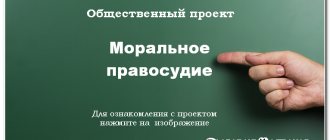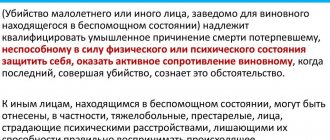Article 80 of the Code of Criminal Procedure of the Russian Federation (with comments).
Article 80 of the Code of Criminal Procedure of the Russian Federation. Conclusion and testimony of an expert and specialist
1. Expert opinion – the content of the study and conclusions presented in writing on the questions posed to the expert by the person conducting the criminal proceedings or the parties.
2. Testimony of an expert - information provided by him during an interrogation conducted after receiving his conclusion, in order to clarify or clarify this conclusion in accordance with the requirements of Articles 205 and 282 of this Code.
3. A specialist’s conclusion is a written judgment on the issues posed to the specialist by the parties.
4. Testimony of a specialist - information provided by him during interrogation about circumstances requiring special knowledge, as well as an explanation of his opinion in accordance with the requirements of Articles 53, 168 and 271 of this Code.
Commentary on Article 80 of the Criminal Procedure Code of the Russian Federation - Conclusion and testimony of an expert and specialist - prepared by a team of scientists under the scientific editorship of Doctor of Law, Professor, Honored Lawyer of the RSFSR, Honored Scientist of the Russian Federation, Full Member of the Russian Academy of Natural Sciences Zagorsky G.I.
Expert opinions serve as a separate type of evidence.
This type of evidence in criminal proceedings is used for the purpose of a comprehensive and objective study of the circumstances to be proven in a criminal case, when, in resolving issues that have arisen during judicial proceedings, research using special knowledge in science, technology, art or craft is required.
The subject of this type of evidence is information (information) that is reflected in the very content of the study, as well as in the conclusions on the issues that were posed to the expert by the person conducting the criminal proceedings or the parties to the criminal proceedings.
An inseparable component of the subject of this type of evidence is the content of the study itself and the conclusions of this study. An essential element of the research conducted is the method that was used in the process of this research. Thus, an expert’s conclusion will be considered unfounded if the conclusions are not sufficiently substantiated and the necessary methods and techniques of expert research are applied incorrectly 1.
1 See paragraph 15 of the Resolution of the Plenum of the Armed Forces of the Russian Federation of December 21, 2010 No. 28 On forensic examination in criminal cases.
At the same time, in accordance with the Resolution of the Plenum of the Supreme Court of the Russian Federation of December 21, 2010 No. 28, the questions posed to the expert and the conclusion on them cannot go beyond the scope of his special knowledge.
Raising before the expert legal issues related to the assessment of the act, the resolution of which falls within the exclusive competence of the body conducting the investigation, the prosecutor, the court (for example, what took place - murder or suicide), as not being within the competence, is not allowed 1.
1 See paragraph 4 of the Resolution of the Plenum of the Armed Forces of the Russian Federation of December 21, 2010 No. 28 On forensic examination in criminal cases.
4. In addition, in accordance with the Resolution of the Plenum of the Supreme Court of the Russian Federation dated December 21, 2010 N 28, if the research goes beyond the competence of one expert or commission of experts, in accordance with Art. 201 of the Code of Criminal Procedure of the Russian Federation, a complex examination may be ordered, carried out by several experts based on the use of various special knowledge. The experts draw up a joint conclusion 1.
1 See paragraph 12 of the Resolution of the Plenum of the Armed Forces of the Russian Federation of December 21, 2010 No. 28 On forensic examination in criminal cases.
The procedural source of an expert’s opinion is the procedural document itself in the form of an expert’s opinion.
The essential provisions of the conclusion itself are the signatures of the experts (expert) who conducted this study, as well as the fact that the experts (expert) were warned of criminal liability for giving a knowingly false conclusion in accordance with Art. 307 of the Criminal Code of the Russian Federation, as well as for the disclosure of preliminary investigation data in accordance with Art. 310 of the Criminal Code of the Russian Federation. Moreover, each expert has the right to sign a general conclusion or that part of it that reflects the progress and results of the research he personally conducted.
The expert's conclusion as a type of evidence must be assessed in accordance with the requirements of Art. 88 Code of Criminal Procedure of the Russian Federation.
In accordance with Resolution of the Plenum of the Supreme Court of the Russian Federation of December 21, 2010 No. 28, the expert’s opinion, like all evidence (Article 240 of the Code of Criminal Procedure of the Russian Federation), is subject to direct examination in a court hearing. When assessing an expert’s opinion, it should be borne in mind that it does not have pre-established force, does not have an advantage over other evidence, and is assessed according to general rules in conjunction with other evidence. At the same time, it is necessary to take into account the qualifications of the expert, find out whether he was provided with sufficient materials and appropriate research objects 1.
1 See paragraph 19 of the Resolution of the Plenum of the Armed Forces of the Russian Federation of December 21, 2010 No. 28 On forensic examination in criminal cases.
Expert testimony is also identified as a separate type of evidence.
As a rule, this type of evidence appears in criminal proceedings after the expert gives his opinion. The purpose of the appearance of this type of evidence in criminal proceedings will be to clarify or clarify the expert’s conclusions, which he provided during the criminal proceedings.
The subject of the expert's testimony as a type of evidence is the information he provides regarding the research he conducted, in particular the content of the research conducted, and information regarding the conclusions of the research conducted.
The procedural source of the expert’s testimony will be the presence of a person’s procedural status - an expert as a participant in criminal proceedings.
In this case, the person acquires the procedural status of an expert in accordance with the requirements of Art. 57 Code of Criminal Procedure of the Russian Federation. (For more details, see the commentary to Article 57 of the Code of Criminal Procedure of the Russian Federation.)
Expert testimony as a type of evidence must be assessed in accordance with the requirements of Art. 88 Code of Criminal Procedure of the Russian Federation.
Therefore, the interrogation of an expert as a separate type of investigative action is provided for in Art. 205 of the Code of Criminal Procedure of the Russian Federation. At the same time, the Code of Criminal Procedure of the Russian Federation does not provide for a procedural procedure for questioning an expert, therefore, in practice, for questioning an expert, the general procedure for questioning is used, regulated by Art. Art. 187 – 190 Code of Criminal Procedure of the Russian Federation. In addition, it should be borne in mind that, unlike a victim or witness, an expert is not warned of criminal liability for refusing to give testimony, since such liability is not provided for by the Criminal Code of the Russian Federation. Features of interrogation of an expert in court are determined by Art. 282 of the Code of Criminal Procedure of the Russian Federation.
A separate type of evidence is expert opinions.
This type of evidence is used in criminal proceedings, when there is no need to conduct research in a criminal case, but there is a need to express written judgments regarding questions posed in writing.
The subject of the specialist’s conclusion will be information (information) given on the basis of special knowledge, which represents judgments that are set out in writing regarding the issues raised.
The procedural source of this type of evidence will be a procedural document in the form of a specialist’s opinion.
In this case, an essential provision of the specialist’s conclusion is the signature of the specialist who expressed a written opinion on the questions raised. In addition, an essential provision of this conclusion is the fact that the specialist was warned of criminal liability for disclosing preliminary investigation data in accordance with Art. 310 of the Criminal Code of the Russian Federation, if he was warned about this in advance in the manner established by Art. 161 Code of Criminal Procedure of the Russian Federation.
The conclusion of a specialist as a type of evidence must be assessed in accordance with the requirements of Art. 88 Code of Criminal Procedure of the Russian Federation.
In accordance with the Resolution of the Plenum of the Supreme Court of the Russian Federation dated December 21, 2010 No. 28, the specialist’s conclusions are subject to verification and evaluation according to general rules (his competence and disinterest in the outcome of the case, the validity of the judgment, etc.) and can be accepted by the court or rejected, like any other evidence 1.
1 See paragraph 20 of the Resolution of the Plenum of the Armed Forces of the Russian Federation of December 21, 2010 No. 28 On forensic examination in criminal cases.
The testimony of a specialist acts as a separate type of evidence.
In addition, the purpose of using this type of evidence is related to the fact that in the process of criminal proceedings it is not necessary to conduct an appropriate study.
The subject of the specialist’s testimony will be information regarding circumstances requiring special knowledge in criminal proceedings, as well as in connection with the explanation of his opinion regarding the giving of a written opinion by the specialist himself.
The procedural source of a specialist’s testimony will be the person’s procedural status – a specialist as a participant in criminal proceedings.
In this case, the person acquires the procedural status of a specialist in accordance with the requirements of Art. 58 Code of Criminal Procedure of the Russian Federation. (For more details, see the commentary to Article 58 of the Code of Criminal Procedure of the Russian Federation.)
The testimony of a specialist as a type of evidence must be assessed in accordance with the requirements of Art. 88 Code of Criminal Procedure of the Russian Federation.
The interrogation of a specialist as a separate type of investigative action is not provided for by the current Code of Criminal Procedure of the Russian Federation. In this regard, the established practice of interrogating a specialist in accordance with the general requirements for interrogating a witness (Articles 187 - 190, 278, 278.1, 279 of the Code of Criminal Procedure of the Russian Federation) seems justified, taking into account certain features (just like an expert, a specialist is not warned of criminal liability for refusal to testify). In addition, in accordance with Resolution of the Plenum of the Supreme Court of the Russian Federation dated December 21, 2010 No. 28, a specialist who participated in any investigative action may, if necessary, be questioned in a court hearing about the circumstances of its production as witness 1.
1 See paragraph 21 of the Resolution of the Plenum of the Armed Forces of the Russian Federation of December 21, 2010 No. 28 On forensic examination in criminal cases.
Share link:
Remote interrogation
May 28, 2021 11:56 am
"Rossiyskaya Gazeta": The government supported the draft amendments to the Code of Criminal Procedure of the Russian Federation, which prescribes the procedure for conducting interrogation via video link
If the initiative is accepted, the investigation will be able to literally communicate with witnesses and victims over the phone and even conduct confrontations. Member of the Council of the Federal Chamber of Lawyers of the Russian Federation, adviser to the FPA RF Elena Avakyan emphasized that the very idea of introducing an interrogation mechanism using a video-conferencing system into the Code of Criminal Procedure of the Russian Federation is correct and expected.
The author of the initiative is Senator Andrei Kutepov. A positive response was received from the Government of the Russian Federation, but with some comments. For example, as experts clarified, it is necessary to spell out in detail the procedure for identifying the person from whom the investigator takes testimony via video. Is this the same citizen on the line? Is there a replacement?
Elena Avakyan, member of the Council of the FPA RF, adviser to the FPA RF, noted that during the period of restrictive measures in connection with the pandemic, the development of various remote procedures has become especially relevant. Courts now actively use web communication technologies in conducting trials.
Citizens were given the opportunity to participate in court hearings using gadgets. However, during the investigation of criminal cases, situations often arise when the investigator does not have the opportunity to invite the right person personally to the office. And the pandemic may have nothing to do with it. It happens that an important witness was passing through the crime scene, but he himself lives in another city.
Today the issue is resolved this way: either the witness comes to meet with the investigator (or is brought in), or the investigator sends an order to colleagues in another region, and local investigators themselves interrogate the witness and then send answers.
“If interrogation via video-conferencing becomes procedurally feasible, then the number of movements of witnesses and the issuance of individual orders within the framework of investigative actions regarding the conduct of interrogation at the location of the witness will sharply decrease,” says Elena Avakyan.
According to her, when this law is adopted, the issue of allowing the defendant’s defense lawyer to have access to meetings with his client, who is in a pre-trial detention center, using video conferencing, must certainly be resolved.
In fact, as many years of practice have shown, this is a fairly important issue, and the outcome of the trial sometimes depends on its solution. Now, in order to meet with a client, a lawyer must obtain permission and perform a number of procedural steps. All this, of course, takes time.
But it happens that new circumstances suddenly appear in the accused’s case, requiring prompt explanations from the defendant and, possibly, some additional actions by the defense attorney. A videoconferencing service can provide him with a quick connection with his ward. It is clear that the accused will not have free access to it around the clock. But his access to videoconferencing in emergency cases is probably possible.
“During the pandemic, we were faced with the fact that some regions began to practice a form of remote interaction. However, the absence of a direct indication of such a possibility in the criminal procedural legislation made this interaction not fully legitimate. Subsequently, this caused a number of problems in the development of this institution. We believe that the bill will allow us to solve the problem comprehensively,” says Elena Avakyan.
As for identifying citizens with whom the investigator will communicate via video link, this is technically solvable.
Source: Rossiyskaya Gazeta.
SharePrint Direct link to the material:
Share



